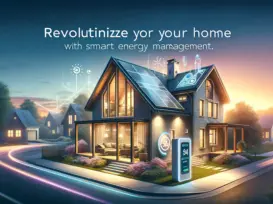Grus Home Energy - Smart Energy Solutions
Revolutionizing Power Management: Embracing Smart Energy Solutions for a Sustainable Future
Revolutionizing Power Management: Embracing Smart Energy Solutions for a Sustainable Future
In a world where climate change is increasingly influencing policy and consumer choices, smart energy solutions represent a beacon of hope for a sustainable future. These innovative systems offer the potential to transform how we generate, distribute, and use energy, making the process more efficient, reliable, and environmentally friendly.
Smart energy solutions encompass a broad range of technologies and practices. At the heart of this revolution is the Smart Grid, an electricity supply network that uses digital communications technology to detect and react to local changes in usage. Unlike traditional grids, smart grids can automatically optimize the performance of the different interconnected elements of the power supply chain. This includes the power plants, the renewable energy sources, and the consumers themselves.
One of the key benefits of smart energy systems is their ability to integrate renewable energy sources like solar and wind power. With traditional energy grids, the variability of these sources can be challenging to manage. However, smart grids, equipped with advanced forecasting and energy storage solutions, can adapt to fluctuations in supply and demand, ensuring a steady energy flow even when the sun isn’t shining or the wind isn’t blowing.
Another cornerstone of smart energy solutions is the use of smart meters in homes and businesses. These devices allow for real-time tracking of energy usage, giving consumers detailed insights into their consumption patterns. This information can empower individuals and organizations to make more informed decisions about their energy use, leading to cost savings and reduced carbon footprints.
Smart meters also pave the way for dynamic pricing models, where electricity costs vary depending on the time of day and demand levels. This can encourage users to shift their energy-intensive activities to off-peak hours, helping to balance the load on the grid and preventing the need for additional power plants.
In addition to smart grids and meters, smart energy solutions also involve the deployment of energy-efficient appliances and building designs. These can significantly reduce the overall energy demand without compromising on comfort or convenience. For example, LED lighting, high-efficiency HVAC systems, and smart thermostats can all contribute to lower energy consumption.
Energy management systems (EMS) are becoming increasingly sophisticated as well, using artificial intelligence and machine learning to analyze usage patterns and automate energy-saving decisions. These systems can control lighting, heating, and cooling in real time, adapting to the presence of people in a building and the external weather conditions.
The transportation sector is also benefiting from smart energy solutions. Electric vehicles (EVs) are becoming more popular, and their integration into the smart grid is a focus of innovation. Vehicle-to-grid (V2G) technology allows EVs to communicate with the power grid to sell excess electricity back to the grid or charge during off-peak hours, further enhancing the grid’s stability and resilience.
Despite the promise of smart energy solutions, there are challenges to overcome, such as the need for substantial investment in infrastructure, regulatory hurdles, and concerns over data privacy and cybersecurity. However, the potential benefits — including lowering greenhouse gas emissions, reducing energy costs, and creating a more resilient energy system — make the pursuit of these technologies imperative.
As governments, businesses, and consumers become increasingly aware of the importance of energy efficiency and sustainability, smart energy solutions are set to play a critical role in shaping the future of our planet. By harnessing data, adopting innovative technologies, and fostering a culture of energy consciousness, we can create a more sustainable and prosperous world for generations to come.
Blog, Smart Home Automation , February 14, 2024 , Energy Consumption Monitoring, Energy Efficiency Improvements, HEMS, Home Energy Automation, Home Energy Management Systems, IoT Home Energy, Reduce Energy Costs Home, Renewable Energy Integration, Smart Energy Solutions, Smart Home Technology, Sustainable Home Energy
Blog, Home Safety & Risk Prevention , February 17, 2024 , Advanced Sensor Water Leak, Eco-Friendly Home Solutions, Energy Efficiency Improvements, Home Water Management System, Leak Detection Technology, Prevent Water Damage, Prevent Water Leaks, Real-Time Water Flow Monitoring, Reduce Water Bills, Smart Energy Solutions, Smart Home Water Efficiency, Smart Water Monitor, Water Conservation Solutions
©2025 All Rights Reserved. Grus IoT Co.,Ltd.

